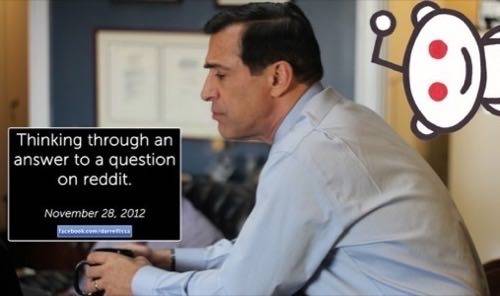
Last week California Rep. Darrell Issa took to Reddit to introduce and field questions about his new draft law to keep the Internet free from legislative changes for the next two years. And the Republican politician got eaten alive by members of the left leaning site.
Detractors challenged everything from Isaa’s wishy-washy record with previous Internet regulation laws (he supported CISPA, the Cyber Intelligence Sharing and Protection Act, yet vocally opposed SOPA, the Stop Online Piracy Act) to the broad language of his new Internet American Moratorium Act (IAMA), calling it a backdoor way to curb the FCC’s mandate on net neutrality and a PR move to use Reddit as a soapbox to appeal to the online demographic.
This isn’t Issa’s first time to the Internet rodeo. He hosted a Reddit AMA exchange earlier this year (before President Obama did, see I Am A President – Obamamania Shuts Down Reddit) to speak on his regulation stance. In November, Isaa took to TechCrunch to explain Making Government Suck Less (seriously, that’s the name of the article he wrote). The result there was very similar to his Reddit move: Issa got skewered.
As the barbs flew and fingers pointed, we at ReadWrite reached out to the Congressman. As expected, Issa’s offices kept its answers politically… correct.
Questions And… Answers?
“I’m trying to create a two-year cooling off period on new Internet rules, regulations and laws. Period. I believe that is a good thing right now,” Issa said during the Reddit AMA.
Issa, who his office described to me as a “frighteningly big geek,” said while the move to introduce the bill on Reddit doesn’t create greater transparency of the legislative process, it does spark debate and give a voice to the Internet. Hundreds of comments later, that’s proved to be a huge understatement.
“This was Congressman Issa’s second AMA, so he knew what to expect,” Issa’s office wrote in an email to RW. “Reddit users tend to value individual liberty, technology and open debate, values shared by the Congressman, and the AMA format itself is a good way to start the discussion on how government should or should not interfere with the Internet.”
And Issas’s office says the bill is not aimed at any particular policy or regulation. They frame it as a way for everyone potentially impacted by new Internet-related laws or rules to come together, learn from one another and actually understand the issues at stake.
What’s Really Going On?
Here’s the meat of the bill: “It is resolved in the House of Representatives and Senate that they shall not pass any new legislation for a period of 2 years from the date of enactment of this Act that would require individuals or corporations engaged in activities on the Internet to meet additional requirements or activities.”
So what does this mean? Really?
Since most people and businesses are engaged in “activities on the Internet,” the bill is a broad stretch, clearly over-reaching in its hopes to restrict Congress’ power. It’s likely more about gaining publicity and congressional support than actually becoming law.
That’s why Suji Mohanty, a cloud strategist at Hewlett Packard, is convinced of the futility of Isaa’s proposal. “I do not see the bill passing,” Mohanty said. “It could lead to a host of other issues such as lack of bipartisan support for any future legislation regarding net neutrality.”
But Mohanty warns that if the bill ties Congress’ hands, telecommunication companies or service providers could modify terms of service with the moratorium, providing a 24-month carte blanche period. This could threaten the very people the bill is supposed to protect.
“Delaying a regulatory period by two years opens the potential for commercial entities to proceed with a lack of governance, creating a potentially larger problem down the road,” he said. “What is to stop a telco or a service provider from introducing new mechanisms curbing net neutrality if regulatory bodies are unable to restore the balance?”
What’s Next?
While it’s highly unlikely that this bill will pass, there are other Internet regulation changes on the horizon worth keeping an eye on. On the positive side, the Senate Judiciary Committee passed a bill last week that would modernize digital privacy and close a loophole, requiring government and law enforcement to receive a warrant before accessing private messages on social networks and email. Previously, anything over 180 days was labeled fair game.
At the same time however, the author of the failed SOPA act, Rep. Lamar Smith (R- Texas)was named the new chairman of the House Science, Space and Technology committee for the next Congress – sometimes derided as the anti-science committee because of the presence of vocal creationist Rep. Paul Broun (R – Georgia), who recently described the Big Bang as “lies straight from the pit of Hell.”
So Why Reddit?
So why did Issa take to Reddit again? In the Reddit chat, Issa defended his record, saying he supported CISPA because the benefits “outweigh the potential costs.” But members of Reddit weren’t buying it, and some said the only reason he even responded to some of these hardball questions is because by the time he responded, the comment threads were ghost towns. And that may just be one reason Reddit is an attractive forum for politicians: It demands less accountability than, say, a Google hangout might.
Photo courtesy of Darrell Issa

















